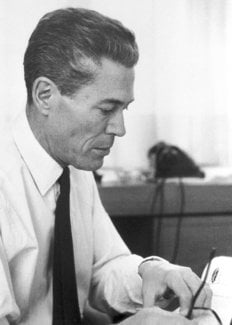Jacques Monod
Biographical

Jacques Lucien Monod was born in Paris on February 9th, 1910. In 1917 his parents settled in the South of France, where Monod spent his early years, and he therefore thinks of himself as a Southerner rather than as a Parisian. His father was a painter, something of an unusual vocation for a Huguenot family in which doctors, ministers of the Church, civil servants, and professors predominated. His mother was American, born in Milwaukee, with a father of Scottish descent – again somewhat out of the ordinary considering French bourgeois tradition at the end of the nineteenth century. His secondary education took place at the lycée de Cannes, and he owes a great deal to some of the masters under whom he was fortunate enough to study. Monod in particular recalls Monsieur Dor de la Souchère, well known as the founder and curator of the Antibes museum. Although Monod remembers nothing of the Greek grammar studied under him, the admiration which he soon developed for this highly cultured and worthy man was of the greatest spiritual benefit for him as a youngster. It is difficult to express just how much Monod owes to his father, who combined artistic sensitivity with prodigious erudition and a passionate concern for intellectual affairs. He had a positivist faith in the joint progress of science and society. It was through his father, who used to read Darwin, that Jacques Monod developed his interest in biology very early in life.
Monod came to Paris in 1928 to begin his higher education, and registered at the Faculty for a degree in Natural Sciences, not realising (as he later found out) that this course was then some twenty years or more behind contemporary biological science. It was from others, a few years senior to himself, rather than from the professional staff, that he gained his true initiation into biology. To George Teissier he owes a preference for quantitative descriptions; André Lwoff initiated him into the potentials of microbiology; to Boris Ephrussi he owes the discovery of physiological genetics, and to Louis Rapkine the concept that only chemical and molecular descriptions could provide a complete interpretation of the function of living organisms.
Monod obtained his Science Degree in 1931, and his doctorate in Natural Sciences in 1941. After lecturing at the Faculty of Sciences in 1934, and spending some time at the California Institute of Technology on a Rockefeller grant in 1936, Monod joined the Institut Pasteur after the liberation as Laboratory Director in Lwoff’s Department. He was made Director of the Cell Biochemistry Department in 1954, and in 1959 was appointed Professor of the Chemistry of Metabolism at the Sorbonne. In 1967 he became Professor at the Collège de France, and in 1971 he was appointed Director of the Institut Pasteur.
The following honours and distinctions were awarded to Professor Monod: Montyon Physiology Prize of the Acadèmie des Sciences (Paris, 1955), Louis Rapkine Medal (London, 1958), Honorary Foreign Member of the American Academy of Arts and Sciences (1960), Chevalier de l’Ordre des Palmes Académiques (1961), Charles Léopold Mayer Prize of the Académie des Sciences (1962), Officier de la Légion d’Honneur (1963), Honorary Foreign Member of the Deutsche Akademie der Naturforscher «Leopoldina» (1965), D. Sc. h. c. University of Chicago (1965), Foreign Member of the Royal Society (1968 ), Foreign Member of the National Academy of Sciences (Washington, 1968), Foreign Member of the American Philosophical Society (1969), D. Sc. h. c. of the Rockefeller University (1970). His military distinctions include: Honorary Colonel of the Reserve, Chevalier de la Légion d’Honneur (military) (1945), Croix de Guerre (1945), and the Bronze Star Medal.
In 1938, Jacques Monod married Odette Bruhl, now the curator of the Guimet Museum. As an archeologist and orientalist with the most sensitive and impeccable taste, his wife brought to the marriage a culture complementary to his own. They have twin sons, Olivier and Philippe. Their father did nothing to influence them to become men of science like himself. On the contrary, he made every effort to persuade them that the realm of knowledge and ideas is not confined to the present-day connotation of the word «science». Both of them nevertheless became scientists: one a geologist, the other a physicist. These two sons gave the parents what they lacked before: two daughters, or rather daughters-in-law, and even a grand-daughter with the pretty name of Claire. The interests of Jacques Monod include almost all aspects of Arts and Sciences, his favourite recreations are music and sailing.
This autobiography/biography was written at the time of the award and first published in the book series Les Prix Nobel. It was later edited and republished in Nobel Lectures. To cite this document, always state the source as shown above.
Jacques Monod died on May 31, 1976.
Nobel Prizes and laureates
See them all presented here.
